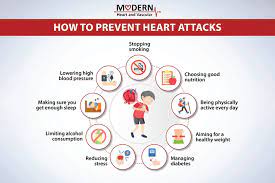Introduction
Heart disease remains a leading cause of mortality globally, emphasizing the importance of understanding its complexities and implementing preventive measures. This guide aims to provide insights into the factors contributing to heart disease, ways to recognize its signs, and effective strategies for prevention.
What is Heart Disease?
Heart disease, also known as cardiovascular disease, encompasses a range of conditions affecting the heart and blood vessels. Conditions such as coronary artery disease, heart failure, and arrhythmias fall under the umbrella of heart disease. Understanding the specific type of heart condition is crucial for effective prevention and management.
Risk Factors for Heart Disease
Several risk factors contribute to the development of heart disease. These include:
Poor Diet: A diet high in saturated and trans fats, cholesterol, and sodium increases the risk of heart disease.
Lack of Physical Activity: Sedentary lifestyles contribute to obesity and other risk factors for heart disease.
Smoking: Tobacco smoke contains chemicals that damage blood vessels and heart tissues, elevating the risk of heart disease.
Excessive Alcohol Consumption: Heavy drinking can contribute to high blood pressure and heart failure.
High Blood Pressure: Hypertension is a significant risk factor for heart disease.
Diabetes: Uncontrolled diabetes increases the risk of heart disease.
Genetics: Family history of heart disease can contribute to an individual’s risk.
Recognizing Signs of Heart Disease
Understanding the signs of heart disease is crucial for early intervention. Common symptoms include:
Chest Pain or Discomfort: Often described as pressure, squeezing, or fullness.
Shortness of Breath: Difficulty breathing or catching one’s breath.
Fatigue: Unexplained tiredness or weakness.
Rapid or Irregular Heartbeat: Palpitations or a fluttering sensation in the chest.
Swelling: Fluid retention leading to swelling in the legs, ankles, or abdomen.
Diagnostic Measures
Diagnosing heart disease involves various medical assessments, including:
Electrocardiogram (ECG or EKG): Records the heart’s electrical activity.
Blood Tests: Assess cholesterol levels, blood sugar, and other indicators.
Echocardiogram: Uses sound waves to create images of the heart.
Stress Test: Measures the heart’s response to exertion.
Coronary Angiography: Visualizes blood flow in the coronary arteries.
Preventive Strategies
Preventing heart disease involves adopting a heart-healthy lifestyle:
Balanced Diet: Emphasize fruits, vegetables, whole grains, lean proteins, and healthy fats.
Regular Exercise: Aim for at least 150 minutes of moderate-intensity exercise per week.
Quit Smoking: Smoking cessation significantly reduces heart disease risk.
Limit Alcohol Intake: Moderation is key for heart health.
Manage Stress: Incorporate stress-reducing practices such as meditation and yoga.
Maintain a Healthy Weight: Achieve and maintain a body weight within a healthy range.
Regular Health Check-Ups: Monitor blood pressure, cholesterol levels, and other cardiovascular risk factors regularly.
Medication and Treatment
For individuals at higher risk or diagnosed with heart disease, medication and medical interventions may be necessary. Common medications include statins, beta-blockers, and antiplatelet agents. In severe cases, procedures such as angioplasty or bypass surgery may be recommended.
Heart-Healthy Habits for All Ages
Heart disease prevention is a lifelong endeavor. Encourage heart-healthy habits from a young age, emphasizing the importance of a nutritious diet, regular exercise, and avoiding tobacco and excessive alcohol.
Conclusion
Understanding and preventing heart disease require a multifaceted approach. By addressing risk factors, recognizing symptoms, and adopting a heart-healthy lifestyle, individuals can significantly reduce their likelihood of developing heart disease. Regular health check-ups, awareness of family history, and proactive management of underlying conditions contribute to a heart-healthy life. Prioritize your cardiovascular health, make informed choices, and take proactive steps to safeguard your heart for a long and vibrant life.

